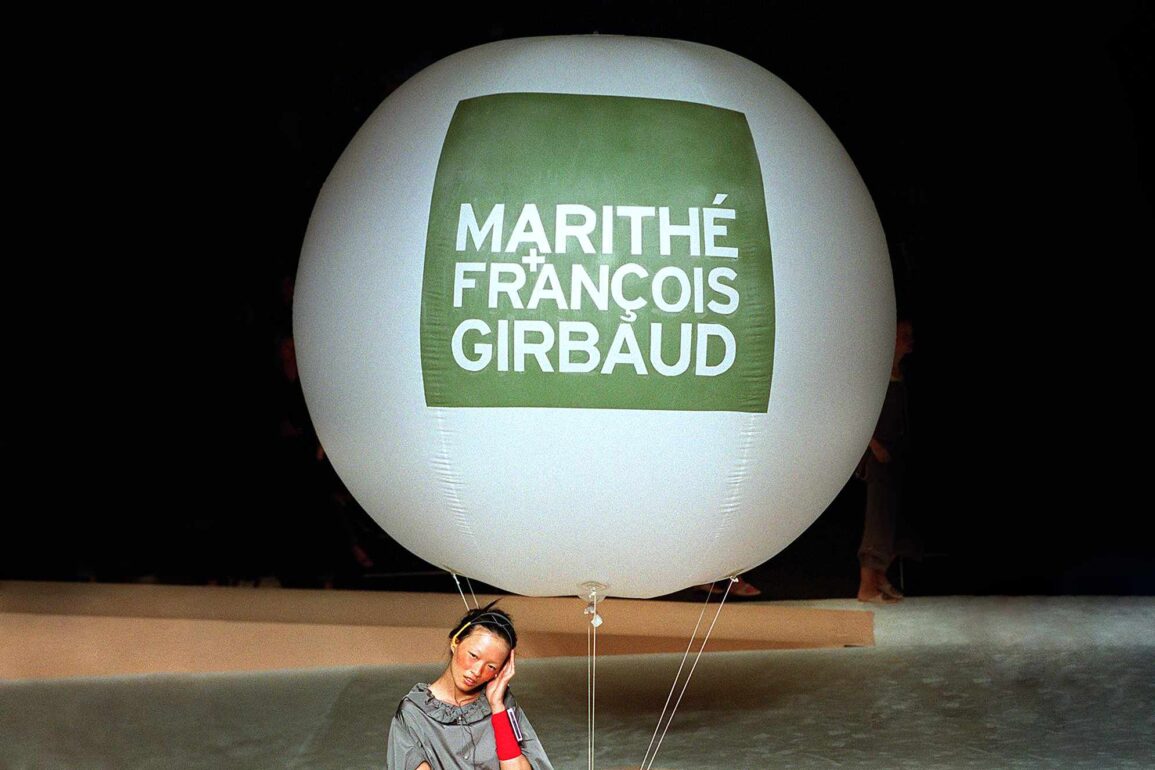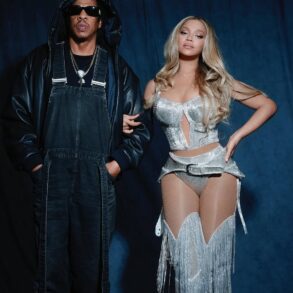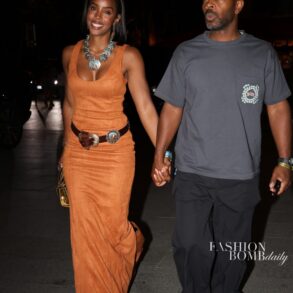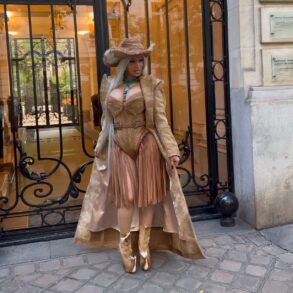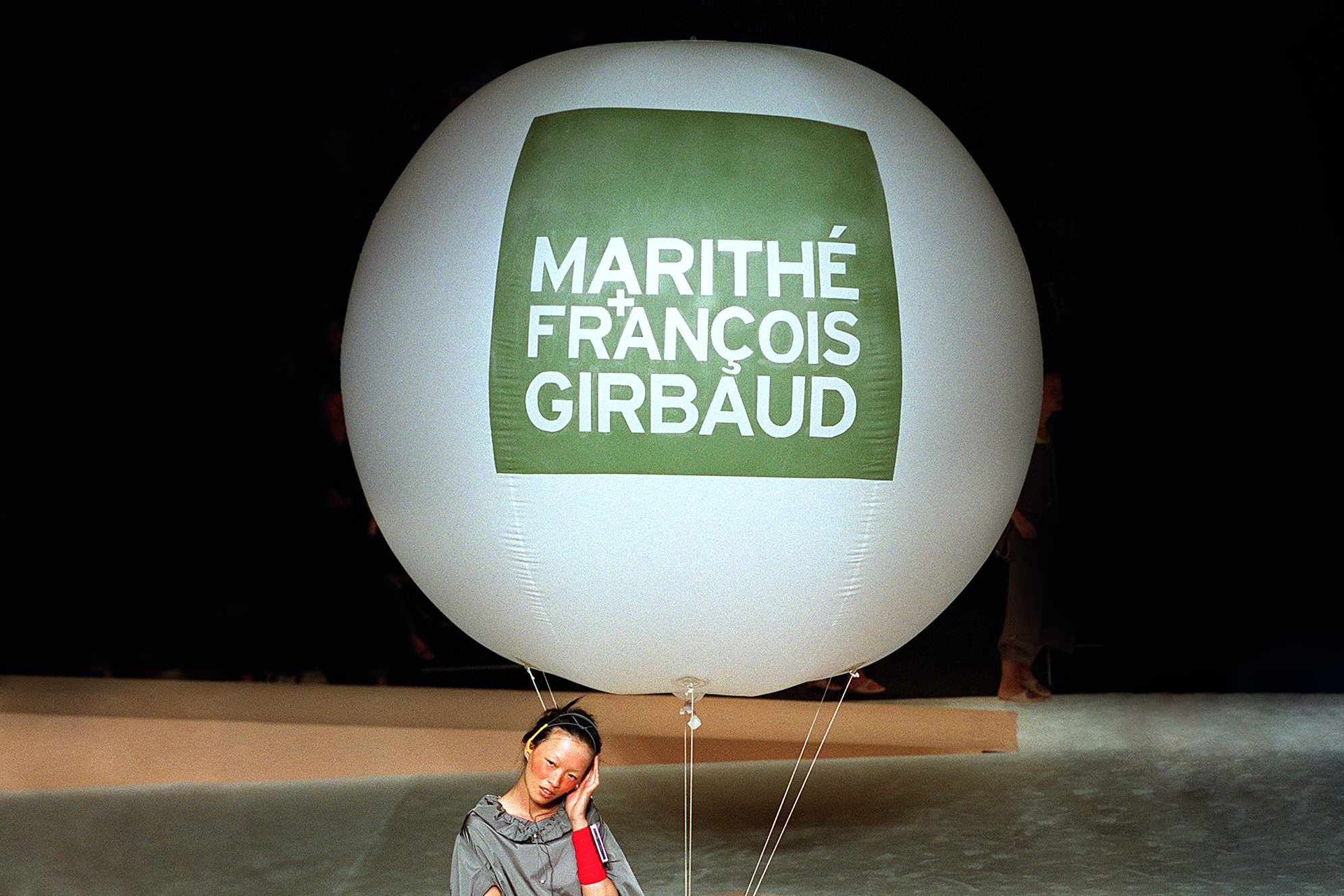
What happened to Marithé + François Girbaud? Once the very definition of designer denim, the venerable French fashion brand has devolved into obsolescence over the couple decades for various reasons: mismanagement, overexpansion, the shifting cycles of trend and taste. No one stays on top forever, after all.
But Marithé + François Girbaud is back, now known as simply Girbaud according to its website, where a proper relaunch is scheduled to drop just ahead of 2024.
That means a possible second chance for one of the fashion world’s great unsung talents, introducing Girbaud to a fresh cache of young fans.
How’d we get here? And why is this kind of a big deal?
A better question to start with, especially for the uninitiated, is: What is Marithé + François Girbaud known for?
Simply put, fancy jeans. More thoroughly explored, an upstart vision of renegade designer fashion.
Founded in the early ’70s, Marithé + François Girbaud pioneered a flavor of futuristic garments that looked ripped out of time: boxy workwear jackets, velvet blazers, exaggerated jersey tops, and, especially, signature baggy stonewashed jeans, branded with a M+FG tab on the fly and rear waistband.
The designs were historically inspired but futuristically uncategorizable, a mélange of silhouettes more advanced than any “designer denim” brand that’d follow. A single collection might juxtapose knit sportswear, elegant shearling outerwear, and draping workwear in the span of only a few looks.
You bought into Marithé + François Girbaud with the jeans; you stayed because who else offered a comparably tasteful blend of absurdly elegant bouclé sets and boilersuits?
One contemporary archivist likens vintage Marithé + François Girbaud creations to Issey Miyake’s next-gen ingenuity (consider Miyake’s trademark Windcoat to Girbaud’s generous outerwear), not unfairly. I’d also consider Claude Montana, Mandarina Duck, and Thierry Mugler’s figure-warping wonders as worthy peers.
Especially for a brand best-known for denim, this is high praise.
I’d argue that one of Girbaud’s biggest wins was inspiring Levi’s to launch its own experimental, fashion-forward line, Levi’s RED. Admittedly, it’s speculation on my part that Levi’s was following Girbaud’s lead at all but I can’t imagine that the American denim giant wasn’t angling to tap into the then-burgeoning market for designer jeans.
Married couple Marithé + François Girbaud first founded their eponymous label as ÇA in France.
They were sued over copyright by a fabric manufacturer of the same name and thus shifted their company’s name to 11342 (the case number of the suit).
Once the case was closed, the label became, appropriately, Closed (which still operates today as a separate company), which became synonymous for distinctive seams that crisscrossed at the crotch, an evolution of Girbaud’s own Brand X design.
Michael Jordan was a fan. So was Janet Jackson, Michael Keaton, Metallica drummer Lars Ulrich, and, decades later, Beyoncé.
By the ’90s, Girbaud references were common fare among rappers like Biggie, Outkast, and Master P. Gimmick group Kriss Kross wore its jeans backwards in the video for MTV-dominating single “Jump.”
The company was a veritable status symbol, though that wasn’t necessarily to co-founder François Girbaud’s liking.
“Somewhere, the company was running too much in some direction, too much in hip-hop stuff,” Girbaud reportedly said at a party in 2007. “I’m not the rap people. Sure, we introduced the baggy jeans, we introduced stonewashed, and all this stuff in the ’60’s or ’70’s, I never target just to be ethnic. It’s stupid.”
Maybe it was the incendiary disdain for its famous customers, maybe it was a lack of innovation, maybe it was the 2008 financial crisis (definitely didn’t help), but by the early 2010s, Marithé + François Girbaud was on the outs, undergoing legal reorganization due to flagging sales.
Marithé + François Girbaud declared bankruptcy in 2012. The label still exists and was producing collections for its French flagship stores as recently as 2019 but has remained mostly quiet until it began teasing its relaunch on November 21, 2023.
Interestingly , Girbaud’s French parents previously sold off international licenses that seem to be doing quite well: separate Marithé + François Girbaud brands currently operate in the Philippines and South Korea, for instance. The latter even hosts an English-language web store.
These companies bear little resemblance to the original Marithé + François Girbaud except in name and overarching ethos.
The Korean imprint, for instance, faithfully recreates the original Girbaud’s far-reaching design cues with its own expansive collections that bring in a li’l prep here and a li’l workwear there, but the resulting product is assuredly conventional in comparison to Girbaud’s pioneering creations.
Over in America, where Girbaud was once the hottest brand in the world, the brand has enjoyed some resurgence among Y2K-obsessed teens, who determinately hunt thrift stores for vintage scores.
Born decades after Marithé + François Girbaud’s heyday, this new generation of fans has nonetheless inspired a renewed Girbaud brand, with the original founders in tow.
Is the world ready for a Girbaud rebrand? I’d say so.
Girbaud both predates the rise of upstarts like Evisu and True Religion, labels that usurped Girbaud’s popularity among musicians in the aughts, and houses a design legacy far more advanced than either of them.
We’re talking about a brand that dominated the runways of Paris and got namechecked by Lil Wayne decades later. That’s some staying power.
Now, does the world need another retro brand to return? Not necessarily. Which makes it all the more pertinent that Girbaud lean hard into its agelessly inventive archive.
There are enough pairs of vintage M+FG jeans in the world to render regular ol’ branded jeans irrelevant. Let’s see Girbaud return to innovation.
Shop our favorite products
This post was originally published on this site be sure to check out more of their content.




